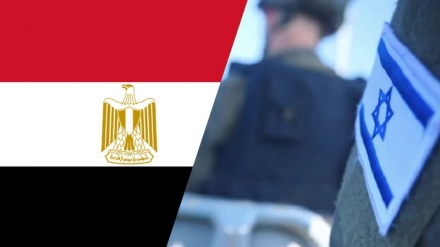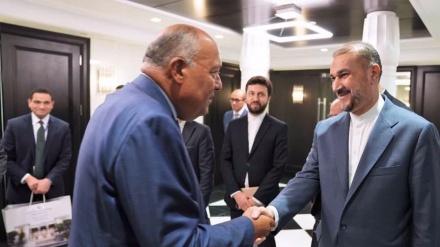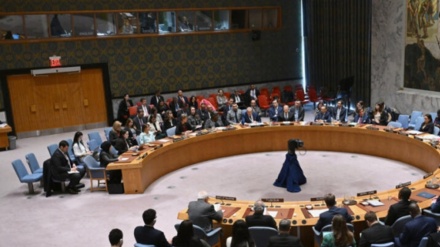Morsi died or was murdered, while reciting patriotic poem in a cage
Mohammed Morsi tried to please everyone in a terribly divided Egyptian society, but in the end, nobody was satisfied, says USSR born Czech-Russian philosopher, novelist, filmmaker and investigative journalist Andre Vltchek who has covered wars and conflicts in dozens of countries, and wrote several books from his adopted homeland, the US, including “Exposing Lies of the Empire”.
Now we have more about his article that appeared in ‘New Eastern Outlook’, titled: “Morsi died or was murdered, while reciting patriotic poem in a cage”.
On June 17 in Cairo, former President of Egypt, Mohammed Morsi, had finished his 15-minute discourse in a courtroom, while being locked inside a sound-proofed cage. He read a poem about his love for Egypt, and then collapsed, and died.
His demise sent shock-waves all over Egypt, the region and the Muslim world. Turkish President Rajab Tayyeb Erdoghan refused to accept the official story, claiming that the former Egyptian president Mohammed Morsi “did not die, he was murdered”.
More came from different corners of the world. According to Reuters, British member of Parliament, Crispin Blunt, who had led a delegation of UK lawmakers and lawyers last year in putting out a report on Morsi’s detention, slammed the conditions of Morsi’s incarceration. He said: “We want to understand whether there was any change in his conditions since we reported in March 2018, and if he continued to be held in the conditions we found, then I’m afraid the Egyptian government are likely to be responsible for his premature death.”
Human rights organizations, heads of state, as well as the common citizens of Egypt, were outraged by the demise of Mohammed Morsi, a former Egyptian leader who governed the nation after winning the first democratic elections in the modern history of the country in 2012, just a year after the brutal pro-Western dictator, Hosni Mubarak, was deposed in 2011.
Morsi was overthrown in 2013, in a violent military coup just one year after he was sworn into the highest office.
Let’s be clear: Mohammed Morsi may not have been a ‘good president’. In fact, he was not supposed to be a president at all. The original candidate from his party was disqualified from the elections on a technicality, and Morsi was asked to take his place. And he won, by a small margin.
He made some serious errors, politically, economically and socially. He fell to the deceit of Saudi Arabia which backstabbed him. He flooded tunnels between Gaza and Sinai. Under his leadership, more than 40 people died during the violence in Port Said. When he felt threatened, he used to give orders to fire poisonous gasses at the protesters.
But he was not a murderer. And in ‘modern’ Egypt, that was quite an achievement. He tried to improve the dire situation in his country, but he kept failing.
On the other hand, he separated his government from the gangrenous military embrace. The western-sponsored Egyptian military has been managing to infiltrate everything (under Mubarak’s rule as well as now), fully controlling all aspects of the Egyptian state.
Morsi tried to please everyone in the terribly divided Egyptian society. But in the end, nobody was satisfied.
Hard-liners in his Muslim Brotherhood hated him for not being radical enough. The anti-religious Left despised him for not pushing harder for social reforms, and for a secular state, he was both obeying the US and the IMF, while at the same time alienating them. In the end, he appeared like an uncertain, confused and weak man.
In 2012 and 2013, my friends, my left-wing comrades, were battling police in front of the Presidential Palace in Cairo. I was there, with them, filming, face covered with water-soaked rags in order to at least somehow protect myself from the highly poisonous teargas.
In those days, no one seemed to like Morsi. The rallying cry during the anti-Morsi protests was: We sing to those who deserve to die; Morsi-Morsi-Morsi!”
Protesters could not have known that 7 years later, their prophecy would come true.
After the military overthrew the democratically elected government (on 3 July 2013), massacres began. Officially hundreds, but most likely thousands of people lost their lives. Tens of thousands were arrested, disappeared, tortured, raped, and exiled.
Members of the Muslim Brotherhood were liquidated (soon after the coup it became a banned organization), but also various left-wing organizations and individuals, as well as all those people who were against the corrupt right-wing military and its dictatorship.
Several of my friends had to leave the country. Others are still in prison, or in hiding.
Former dictator, Western puppet and assassin Hosni Mubarak, is now a free man again. He is 91 years old, while 67-year-old Mohammed Morsi is dead.
During the Morsi era, as well as during and after the 2013 coup, I was working in Egypt, making a documentary film for the Venezuelan television channel Telesur (“Egipto – El Fin de Una Revolucion” – “Egypt, End of the Revolution”).
First, I investigated and wrote about the crimes committed during the reign of President Morsi in the city of Port Said, titled: “Notes from a Besieged City”.
And then, I was right there, in the middle of the battles, when the Egyptian military overthrew Morsi’s government and began liquidating both the Muslim Brotherhood, and the Egyptian left wing. I described the events in my essays “Egypt End of Hope” and “Egypt in the Eye of the Storm”. Many more essays from Egypt were then compiled in my book “Exposing Lies of The Empire”.
Once, while filming after the coup, I found myself facing 5 talks, all pointing their cannons at me. How I survived, I am not sure. Others did not. By the time I finished collecting footage for my film, my body was covered by scars and bruises.
From among those individuals who used to work with me on the film, and from those who used to protest against then-President Morsi, there is hardly anyone now who would support the current rule of the pro-Western military junta.
Rallies in 2012 and 2013 were all about improving Egypt; about forcing Morsi to deliver what millions of mostly young Egyptians hoped would be a just and socialist society. Morsi was expected to deliver, or to resign, giving way to a better, more ‘progressive’ leader.
What came instead was a coup, a return of the fascist clique of Mubarak, supported by the US, Europe and Israel.
Looking back, I believe that Mohammed Morsi was a decent human being, but at the same time a bad, untalented, naive and confused ruler. That was still much, much better than what was before and after him.
In her opinion piece for the New York Times, the Egyptian author Mona al-Tahawy wrote about the demise of Mohammed Morsi: “He always looked like a man caught up in something much bigger than him. That he died in an Egyptian courtroom inside a soundproof cage designed to silence him, almost exactly six years to the day he took office and almost completely forgotten by all but his family and human rights activists, is a reminder of the bathos that surrounded him.”
Then, Ms. al-Tahawy put his death into the context of present-day Egypt: “Decimated as it is, however, the Muslim Brotherhood is unlikely to be able to pull off mass protests in Egypt, where protests became all but impossible under a draconian law passed soon after General Abdel-Fattah as-Sisi came to power. This, too, is what as-Sisi has achieved: From July 2013, when Morsi was overthrown, and January 2016, when the Egyptian parliament reconvened, between 16,000 and 41,000 people, most supporters of the now-banned Muslim Brotherhood, were reportedly arrested or detained (Some were liberal or secular activists). Since then, a spike in death sentences and executions, extrajudicial killings, forced disappearances and a determined effort to wipe out any form of dissent have all but crushed the Brotherhood, as well as most other forms of opposition. Muslim Brotherhood supporters are insisting that Morsi be eulogized as a martyr at the same time that many state-owned media are reporting on his death without even mentioning that he was once president.”
Frankly speaking, the era of Morsi feels like the only period in modern Egyptian history, when ‘everything was possible’, and when one was at least allowed to dream and to fight for a much better future. Yes, of course, the fight was taking place through teargas, and people got injured, some even killed. But they dared, they were not broken and humiliated like now.
The so-called ‘Arab Spring’ was manipulated, and most likely ‘created’ by the West. But in 2011 to 2013, there was also a parallel, independent, left-wing upsurge of anti-establishment, anti-capitalist and anti-military movements. There was a struggle, and Egypt could have gone in any direction.
I will never forget that year; “the year of Morsi”. We were risking our lives, often suffering direct physical assaults. Different political factions were at each other throats. Steam was out. Passions were boiling. Nothing was certain, everything possible.
That year, while making my film, I was with a group of socialist doctors; staunch Marxists. They did not doubt that Egypt could go socialist if they fought harder. I also worked with Wassim Wady, one of the leaders of the Revolutionary Socialist Organization.
And then, everything collapsed, literally overnight. 3 July 2013.
When did I realize that everything was over? It happened in Heliopolis – in an affluent suburb of Cairo – in a park. Hundreds of rich families went to celebrate the coup, wearing T-shirts depicting as-Sisi and his cronies. It looked like some historic photos from 9-11-1973 – from the days when the coup perpetrated by General Pinochet against President Allende in Chile. It was different, of course it was, but it looked the same. US-sponsored coups always look the same. And so do the faces of the elites that support them!
I read about the demise of Morsi onboard MEA, while flying from Istanbul to Beirut. I felt immense sadness. I did not know why precisely. Certainly, it was not for Morsi’s reign. But most likely it was for that time, for that hope that was now totally choked and abandoned. For the days when ‘everything was possible’; when people were ready and willing to fight for their country.
Egypt is a ‘failed’ state now. Scared, frustrated, poor and totally corrupt. A state that is devouring its own people.
When I go to one of the countless slums of Cairo, these days, people look at me with open hate. They see me as a foreigner, as someone who helped to throw them back to hopelessness and misery. Of course, they don’t know that several years ago I fought for them, at least as a filmmaker, side-by-side with their nation’s socialist vanguard.
I also feel sadness for Morsi the man, if not Morsi the president. I somehow sense that the patriotic poem that he read before collapsing and dying, came straight from his heart.
In one single year when he governed, he did his best. His best was not good enough. He failed.
But he did not deserve to die like this, muzzled and humiliated, in a cage!
He deserved better. And his country, Egypt, deserves much, much better!
AS/ME


